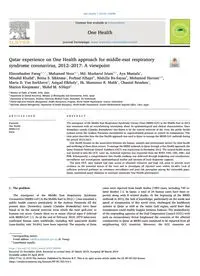
2019 Qatar experience on One Health approach for middle-east respiratory syndrome coronavirus, 2012_2017_ A viewpoint PDF
Preview 2019 Qatar experience on One Health approach for middle-east respiratory syndrome coronavirus, 2012_2017_ A viewpoint
Contents lists available at ScienceDirect One Health journal homepage: www.elsevier.com/locate/onehlt Qatar experience on One Health approach for middle-east respiratory syndrome coronavirus, 2012–2017: A viewpoint Elmoubasher Faraga,⁎,1, Mohamed Noura,1, Md. Mazharul Islamb,1, Aya Mustafaa, Minahil Khalida, Reina S. Sikkemac, Forhud Alhajrib, Abdulla Bu-Sayaab, Mohamed Harouna,b, Maria D. Van Kerkhoved, Amgad Elkholye, Sk. Mamunur R. Malike, Chantal Reuskenc, Marion Koopmansc, Mohd M. AlHajria a Ministry of Public of Health, Doha, Qatar b Department of Animal Resources, Ministry of Municipality and Environment, Doha, Qatar c Department of Viroscience, Erasmus University Medical Center, Rotterdam, the Netherlands d Global Infectious Hazards Management, Health Emergencies Program, World Health Organization, Geneva, Switzerland e Infectious Hazard Management, Department of Health Emergency, World Health Organization, Eastern Mediterranean Regional Office, Cairo, Egypt A R T I C L E I N F O Keywords: One Health MERS-CoV Qatar A B S T R A C T The emergence of the Middle East Respiratory Syndrome Corona Virus (MERS-CoV) in the Middle East in 2012 was associated with an overwhelming uncertainty about its epidemiological and clinical characteristics. Once dromedary camels (Camelus dromedarius) was found to be the natural reservoir of the virus, the public health systems across the Arabian Peninsula encountered an unprecedented pressure to control its transmission. This view point describes how the One Health approach was used in Qatar to manage the MERS-CoV outbreak during the period 2012–2017. One Health focuses on the association between the human, animals and environment sectors for total health and wellbeing of these three sectors. To manage the MERS outbreak in Qatar through a One Health approach, the Qatar National Outbreak Control Taskforce (OCT) was reactivated in November 2012. The animal health sector was invited to join the OCT. Later on, technical expertise was requested from the WHO, FAO, CDC, EMC, and PHE. Subsequently, a comprehensive One Health roadmap was delivered through leadership and coordination; surveillance and investigation; epidemiological studies and increase of local diagnostic capacity. The joint OCT, once trained had easy access to allocated resources and high risk areas to provide more evidence on the potential source of the virus and to investigate all reported cases within 24–48 h. Lack of sufficient technical guidance on veterinary surveillance and poor risk perception among the vulnerable popu- lation constituted major obstacles to maintain systematic One Health performance. 1. The problem The emergence of the Middle East Respiratory Syndrome Coronavirus (MERS-CoV) in the Middle East in 2012 [1] has remained a public health concern particularly in the Arabian Peninsula till the present time. Dromedary camels (Camelus dromedarius) have been found to be the natural reservoir from which the viral spill-over to humans can occur. Camels show no or minor clinical signs if infected with MERS-CoV [2]. As of the end of February 2019, 2374 laboratory confirmed human cases worldwide, including 823 associated deaths (case-fatality rate: 34.6%), have been reported. The majority of these cases were reported from Saudi Arabia (1983 cases, including 745 re- lated deaths) [3]. In Qatar, a total of 24 human cases have been re- ported along with 8 related deaths. At the beginning of the MERS outbreak in 2012, the lack of knowledge, particularly on the mode and speed of transmission of this novel virus, challenged the healthcare systems in Qatar as well as the entire Gulf region, amid fears that transmission could readily happen between humans. The unfamiliarity of the responding agencies of the Gulf Cooperation Council (GCC) with such an extraordinary threat heightened the concerns of the affected communities in Qatar as MERS cases continued to be reported from all neighbouring GCC countries. Moreover, the GCC countries are https://doi.org/10.1016/j.onehlt.2019.100090 Received 10 November 2018; Received in revised form 27 March 2019; Accepted 28 March 2019 ⁎ Corresponding author. E-mail address:
